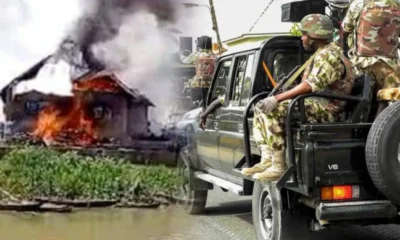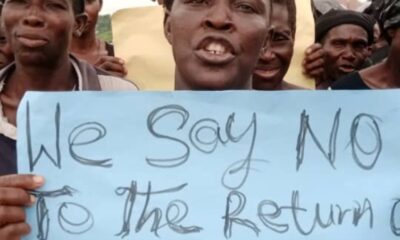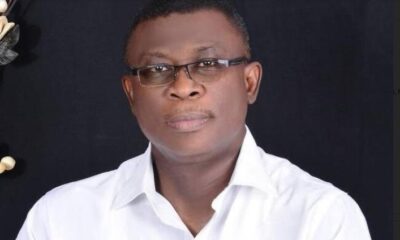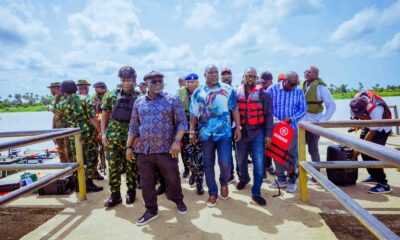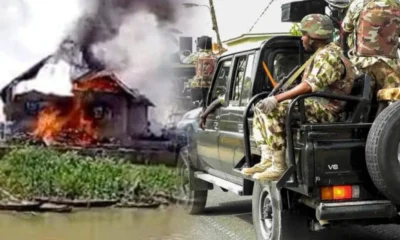Opinion
Okuama: No Substitute For Peaceful Co-Existence
By Francis Ewherido
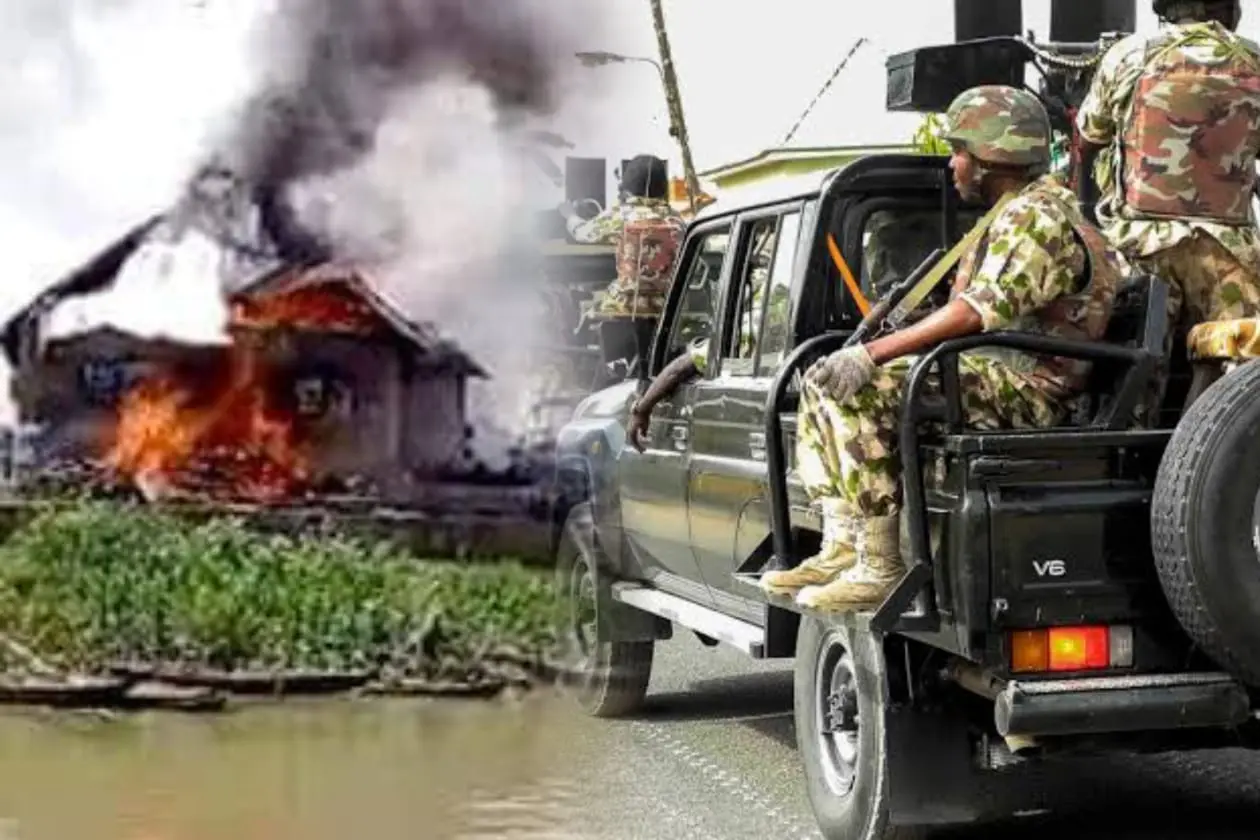
During the week, the Delta State Governor, Elder Sheriff Oborevwori; the members of the Ewu IDP camp Committee for displaced Okuama people and some leaders of Okuama Community held a very fruitful meeting in Asaba, the Delta State capital.
Okuama, you recall, is the community in Ewu Kingdom in Ughelli South LGA of Delta State that was destroyed and levelled by the army in the aftermath of the killing of 17 army officers and soldiers in circumstances that still subject of inquiry and investigation. Okuama people have been reluctant to temporarily move to go to the IDP camp in Ewu-Otor because of rumours that their land will be taken over.
Another factor was the demonstration by Okoloba women that Okuama people should not be allowed to come back to Okuama but be resettled in Ewu! Let me just chip in here that Okuama people need nobody’s consent to return to their ancestral home after the army withdrew from the community. In fact, some of them have already returned, living in the ruins of what they used to call homes.
During the meeting, Governor Oborevwori allayed the fears of the Okuama people. Based on the governor’s assurance to their leaders and clarifications on some misinformation which the IDP committee had sorted out, some Okuama people started moving into the IDP camp last Monday. When I called the camp on Monday morning, I heard many people talking in the background and a member of the committee I spoke with confirmed that they were Okuama people.
The camp has now fully come alive. The committee is dealing daily with the challenges that arise in such IDP camps.
The governor also assured the Okuama leaders that the reconstruction of of their community will start this month with the rebuilding of the health centre and the primary school. Someone asked me what about the homes of Okuama people. The governor did not give details. He talked about starting off with the rebuilding of Okuama primary school and health centre, but common-sense tells me that if the school and health centre are being rebuilt, the homes will also have to be rebuilt because the people will not be coming from Ewu IDP camp to get health care at the health centre, and the students will not be attending the school in Okuama from the Ewu IDP Camp. The distance and logistics make that impossible.
I suggest that the reconstruction should have timelines: clearing of the debris, construction of the school and health centre, private residences, amongst others. The relevant government organs and Okuama people can work out the details. Whatever it will take, the school should be ready by September so that the students can resume the 2024/2025 session there.
That said, a worrisome incident took place earlier. Some Okoloba women went on demonstration that Okuama people should not come back to Okuama but be resettled in Ewu. Why? The demonstration looks to me like something that was sponsored, the hand of Esau and the voice of Jacob. The demonstrators alleged that Okuama people are tenants.
As an Ewu indigene, I have never heard that before. Okuama has been a community in Ewu Kingdom as long as Ewu people I spoke with can remember. Some have maternal forebears dating back who were from Okuama. I called my 90-year-old mother who grew up in Ewu. She said she grew up to meet Okuama community. The first Bishop of Benin Diocese (Anglican Communion), Bishop Agori Iwe, an Ewu Kingdom man, is from Okuama. Documented history has it that he was born in Okuama, Ewu Kingdom, in 1906, where he also accepted the Anglican Faith at an early age. Ewu-Otor and Okuama indigenes I spoke with cannot recall any oral history where Okuama was tenant to Okoloba or anyone. Where did these women mainly under-60 years get their history from. Where is the documented evidence: receipt for payment of rents, tenancy agreement, or treaty or other documentary evidence? I am not a historian and will not delve into what I have limited knowledge of, but let those who alleged should prove legally and lawfully. But I just wonder if that is the paramount issue right now.
Another Ijaw group has kicked against the rebuilding of the school and health centre in Okuama. They asserted that the government should have invited Okoloba people for discussion first. We all want peace in that axis and there is nothing wrong with the government also engaging Okoloba people to find a lasting peaceful solution, but they cannot tie such engagements to rebuilding the Okuama school and health centre. Should Okuama school children stay at home and should Okuama people die from preventable diseases and curable illnesses until Okoloba people meet with the government? All the activities can go on simultaneously. Okuama people are traumatised. If you cannot empathise with them, at least let them be. The soldiers scarcely left before people from neighbouring communities allegedly moved in to steal the remnant of what escaped destruction and what was partially destroyed. Okuama people also alleged that their food crops were harvested and stolen.
I advice all community leaders to be very careful and think through the implications of their utterances and actions. These riverine communities are inhabited by regular locals who are engaged in farming and fishing. They have lived together and intermarried over the years. I was told that the mother of the monarch of one of the neighbouring Ijaw communities is from Okuama. Why sow seeds of discord among these people for personal reasons?
Urhobos, Ijaws, Isokos and Itsekiri are intertwined ethnic groups. Intermarriage and inter-communal life are not only restricted to Okuama and Okoloba, but across Delta State. I am Urhobo from Ewu Kingdom, but I have links to Isoko (Enwhe and Olomoro). I remember in those days when relatives of my father, whose parents migrated from Okpare in Olomu, an Urhobo Kingdom, came to visit us in Ozoro, Isoko North LGA headquarters, they proudly proclaimed my father as “omo mi,” meaning our son). My maternal great grandmother is from Enwhe, while my first cousins are paternally from Enwhe. Some of my nephews and nieces are partly Ijaw, Itsekiri and Isoko. In fact, the home town of my nephews’ maternal grandfather, who is Ijaw, is close to Okuama! So, when I discuss these interethnic issues, I exercise caution like someone trying to kill a tsetse fly that perched on his scrotum. Let us all tread carefully, please.
Moving forward, I reiterate that the state government should properly demarcate the border between Okuama and Okoloba. Okuama is in Ugheli South LGA while Okoloba is in Bomadi LGA. Both communities should be made to sign a new agreement to commit to peaceful coexistence. The earlier agreement has not worked. Both Okuama and Okoloba people should realise that they are both vulnerable in a hostile environment and would be happy in a peaceful environment. Both of them use the same Forcados River and pass through each other’s territory, depending on where they are going to or coming from. There is only one solution: peaceful co-existence. When disagreements arise, they should seek lawful means, not taking laws into their hands. Taking laws into their hands has apparently not worked and will never work. Let’s put an end to the senseless loss of lives. Let reason prevail.
Send Us A Press Statement Advertise With Us Contact Us
And For More Nigerian News Visit GWG.NG


